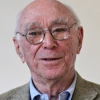Jerome Bruner

Jerome Bruner
Jerome Seymour Brunerwas an American psychologist who made significant contributions to human cognitive psychology and cognitive learning theory in educational psychology. Bruner was a senior research fellow at the New York University School of Law. He received a B.A. in 1937 from Duke University and a Ph.D. from Harvard University in 1941. A Review of General Psychology survey, published in 2002, ranked Bruner as the 28th most cited psychologist of the 20th century...
NationalityAmerican
ProfessionScientist
Date of Birth1 October 1915
CountryUnited States of America
Passion, like discriminating taste, grows on its use. You more likely act yourself into feeling than feel yourself into action.
Organizing facts in terms of principles and ideas from which they may be inferred is the only known way of reducing the quick rate of loss of human memory.
Apollo without Dionysus may indeed be a well-informed, good citizen but he's a dull fellow. He may even be 'cultured,' in the sense one often gets from traditionalist writings in education. . . . But without Dionysus he will never make and remake a culture.
There is, perhaps, one universal truth about all forms of human cognition: the ability to deal with knowledge is hugely exceeded by the potential knowledge contained in man's environment. To cope with this diversity, man's perception, his memory, and his thought processes early become governed by strategies for protecting his limited capacities from the confusion of overloading. We tend to perceive things schematically, for example, rather than in detail, or we represent a class of diverse things by some sort of averaged "typical instance.
Whoever reflects recognizes that there are empty and lonely spaces between one’s experiences.
It is sentimentalism to assume that the teaching of life can always be fitted to the child's interests, just as it is empty formalism to force the child to parrot the formulas of adult society. Interests can be created and stimulated.
Knowledge helps only when it descends into habits.
In time, and as one comes to benefit from experience, one learns that things will turn out neither as well as one hoped nor as badly as one feared.
The main characteristic of play - whether of child or adult - is not it content but its mode. Play is an approach to action, not a form of activity.
The shrewd guess, the fertile hypothesis, the courageous leap to a tentative conclusion - these are the most valuable coins of the thinker at work. But in most schools guessing is heavily penalized and is associated somehow with laziness.
Knowledge is justified belief.
The young child approaching a new subject or anew problem is like the scientist operating at the edge of his chosen field.
Teaching is the canny art of intellectual temptation
Understanding something in one way does not preclude understanding it in other ways.